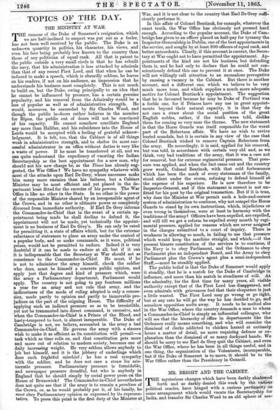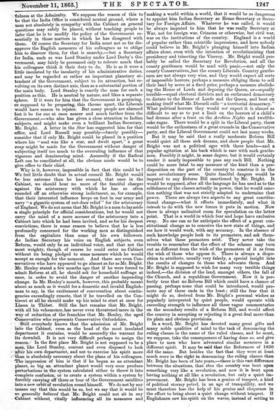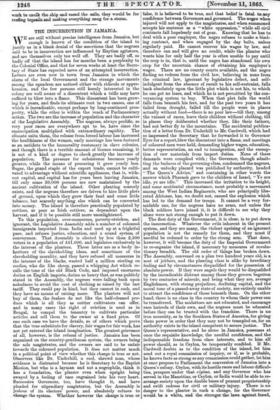MR. BRIGHT AND THE CABINET.
THE mysterious changes which have been darkly shadowed forth and as darkly denied this week by the various political oracles, have hinged with a curious pertinacity on some arrangement which would vacate the Secretaryship for India, and transfer Sir Charles Wood to an old sphere of use- fulness at the Admiralty. We suppose the reason of this to be that the India Office is considered neutral ground, where a man not absolutely in sympathy with the Cabinet on general questions may safely be placed, without teaching people to infer that he is to modify the policy of the Government es- sentially in those matters in which he has disagreed with their. Of course the Secretary for India must not so far dis- approve the English measures of his colleagues as to oblige him to disavow them, for that is anarchy,—but a Secretary for India, such as was Lord Stanley under Lord Derby's Go- vernment, may fairly be presumed only to tolerate much that his colleagues think it their duty to do. He is as it were a little insulated by the insularity of his administrative duties, and may be regarded as rather an important planetary at- tendant of the Government, subject to its attraction, but re- volving on its own distinct axis, than as a substantial portion, of the main body. Lord Stanley is exactly the man for such a position as this. He is neutral by nature, and likes a separate sphere. If it were for him that the Government is preparing, or supposed to be preparing, this throne apart, the Liberals would have reason to rejoice. But many people are alarmed lest it be for one at once nearer and much farther from the 'Government,—who also has given a close attention to Indian subjects, and might make even a brilliant Indian Secretary, Mr. Bright.. A letter in the Star has suggested him for that office, and Lord Russell may possibly—barely possibly— consider that if only Mr. Bright could be placed in a position where his " soul was like a star, and dwelt apart," a great coup might be made for the Government without danger of subjecting itself too much to the overruling influence of that vigorous and domineering mind. Assuredly if the Radical Left can be conciliated at all, the obvious mode would be to give office to their chief. Why is it, however, impossible in fact that this could be We feel little doubt that in actual council Mr. Bright would ize. -less extreme than he has seemed, that once in the Cabinet, we should hear no more of the fanciful charges against the aristocracy with which he has so often -rounded off an otherwise strong indictment, as, for example, that their interested influence keeps on foot in our army and navy " a gigantic system of out-door relief " for the aristocracy -of England. We do not mean that Mr. Bright is a man to lay aside as single principle for official considerations, but he would not carry the mind of a mere accuser of the aristocracy into a Cabinet into which he had been invited, and as for his deepest -convictions, there is some reason to believe that he is less profoundly concerned for the working men as distinguished from the capitalists than some of his own followers. As Indian Secretary his voice on English subjects, even Reform, would only be an individual voice, and that not the most weighty, though of course he could enter no Cabinet without its being pledged to some measure which he would accept as enough for the moment. And there are even Con- vervatives who have appeared to go almost as far as Mr. Bright. Mr. Henley stated a few months ago that if he were forced to admit Reform at all, he should ask for household suffrage at once, in order to avoid the danger of another impending change. In Mr. Henley's mouth, however, this probably meant about as much as it would for a domestic and invalid English- man to say, in the excitement of conversation about contin- gencies exceedingly remote, that if he travelled on the Con- tinent at all-he should make up his mind to start at once for Llassa in Thibet. Still the fact remains that Mr. Bright, with all his vehemence, has never even threatened more in the way of reduction of the franchise that Mr. Henley, the aged 'Conservative who represents Conservative Oxfordshire.
Still everybody knows that the admission of Mr. Bright into the Cabinet, even as the head of the most insulated department it contains, would be assuredly the warrant for its downfall. It is not very difficult perhaps to assign the reason.- In the first place Mr. Bright is not supposed to be a man, like Lord Stanley, content and even disposed to look :after his own department, and not to exercise his spirit more .^ than is absolutely necessary about the plans of his colleagues. 'The impression of. him is that if he began as an attendant planet, so big an attendant planet would very soon produce perturbations in the system calculated either to throw it into -complete confusion, or to create a system within a system by forcibly carrying off three or four of the Government satellites into a new orliit-of revolution round himself. We do not by any -means say that this would be so, but we say that it would be -so generally believed that -Mr. Bright could not sit in any Cabinet without vitally influencing all its measures and malting a world within a world, that it would be as dangerous to appoint him Indian Secretary as Home Secretary or Secre- tary for Foreign Affairs. Whatever he was called, it would be always imputed to him that he was really Secretary at War, not for foreign war, Crimean or otherwise, but civil war, war on the institutions of the country. England is a world of popular rather than scientific impressions, and here nobody could believe in Mr. Bright's plunging himself into Indian affairs alone, even with the intention of revolutionizing that presidency and trisecting the Viceroy. Mr. Bright would pro- bably be called the Secretary for Revolution, and all the county gentlemen would be mad with panic,—not only the county Conservatives,•but the county Liberals. Country gentle- men are not always very wise, and they would expect all sorts of impossible horrors, perhaps a measure obliging them to sell their land by acres at a fixed price, perhaps a measure abolish- ing the House of Lords and deposing the Queen, or—equally terrible—equal electoral districts and an enthroned democracy to dictate to the House of Lords and the Queen, and bent on making itself what Mr. Disraeli calls " a territorial democracy." What political horrors they would not expect it is almost as difficult to say as to put a limit on the horrors of a child's bad dreams after a feast on the Arabian Nights and twelfth- cake sugar. There would be a split in the Liberal party, there would be the enthusiasm of a great crusade in the Conservative party, and the Liberal Government could not last many weeks. But it may be said that a really moderate Reform Bill would quiet all these sick dreams, and show people that Mr. Bright was not a political ogre with three heads—and a popular agitation at his back which is rare with such gentle- men. Possibly it might, in some degree, but it would certainly render it nearly impossible to pass any such Bill. Nothing could be more fatal to any measure of the kind than a pre- disposition on the part of the country to construe it in the most revolutionary sense. Quite fanciful dangers would be imputed to any Reform Bill sanctioned by Mr. Bright. It would be supposed, after all the language he has used as to the selfishness of the classes actually in power, that he would sanc- tion nothing that was not strictly adapted to undermine that power. There are always two aspects to any great constitu- tional change—what it effects immediately, and what it intends to do with the new forces it puts in motion. Now there is always unlimited room for speculation on the latter point. That is a world in which fear and hope have exclusive sway. No one can so far anticipate the effect of a great con- stitutional change as to conceive the new state of things, and see how it would work, with any accuracy. In the absence of such knowledge people look to its promoters, and ask them- selves what these promoters wish. They never take the trouble to remember that the effect of the scheme may turn out as different from the wish of the promoters of it as from the wish of those who oppose it. There is always a dispo- sition to attribute, usually very falsely, a special insight into the results of changes to those who advocate them. And Mr. Bright is supposed to wish for many very terrible things indeed,--the division of the land, amongst others, the fall of the Church, and a republican Government. Now it is per- fectly true that no Reform Bill which could have a chance of passing, perhaps none that could be introduced, would pro- mote any of these ends in the least ; still the fear that it might do so, derived from Mr. Bright's personal wishes as popularly interpreted by quiet people, would operate with exceeding strength to influence all these vague commentaries on the secondary results of a Reform Bill, and would affect the country in accepting or rejecting it a great deal more than its plain and obvious provisions.
In a word, Mr. Bright has devoted many great gifts and many noble qualities of mind to the task of denouncing the ruling classes in the name of the ruled classes, and he must, we suppose, take the consequences of having done so, and give place to men who have advocated similar measures in a different spirit. It may be said that the Reformers of 1830 did the same. But besides the fact that they were at least much more in the right in denouncing the ruling classes than Mr. Bright has been of late years,—there is this vast difference between the situations, that then the country was bent upon something very like a revolution, and now it is bent upon having nothing at all like a revolution, but only a quiet im- provement. Mr. Bright has been a genius of tempest, a kind of political stormy petrel, in an age of tranquillity, and we must therefore lose the help of his genius and eloquence in the effort to bring about a quiet change without tempest. If Englishmen saw his spirit on the waves, instead of setting to
work to caulk the ship and mend the sails, they would be for reefing topsails and making everything snug for a storm.
































 Previous page
Previous page